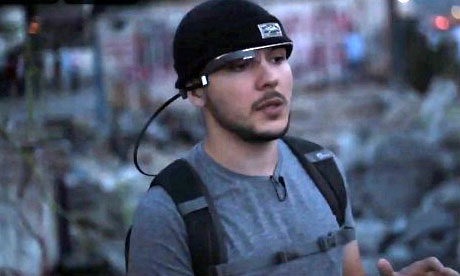tirsdag 27. august 2013
Rimelig, men effektfullt med miniatyrer
Low Budget Visual Effects - Miniatures from Vashi Nedomansky on Vimeo.
Low Budget Visual Effects - Miniatures on Vimeo
tirsdag 20. august 2013
– Politiet har som oppgave å handle om noen har hemmelig informasjon
Vi diskuterer digitalt kildevern i fagstoffet, noe som i høyeste grad blir aktualisert av de siste dagenes hendelser internasjonalt:
Søndag ble David Miranda, samboeren til Guardian-journalisten Glenn Greenwald, som først publiserte Snowdens lekkasjer, holdt tilbake og avhørt i ni timer på Heathrow-flyplassen i London. Britiske myndigheter tok også beslag i alle datamaskinene, mobiltelefonene og annen elektronikk som han hadde med seg da han mellomlandet på Heathrow.
Tirsdag forsvarer britiske myndigheter seg med å si at politiet brukte lovhjemlene slik de skal brukes for å hindre terrorisme.
– Hvis politiet tror at en person er i besittelse av hemmeligstemplet sensitiv og stjålet informasjon som kan hjelpe terrorister må de gripe inn, og lovverket er der for at de skal kunne gjøre det, heter det i en uttalelse fra det britiske innenriksdepartementet.
– Dette er et angrep på pressefriheten. Å anholde min partner for ni timer, uten å gi ham tilgang til en advokat, og beslaglegge hans eiendeler, er helt klart ment som en avskrekkende beskjed til journalister som har rapportert om NSA, sa Glenn Greenwald til sin egen avis.
Kilde: Verden - NRK Nyheter
Søndag ble David Miranda, samboeren til Guardian-journalisten Glenn Greenwald, som først publiserte Snowdens lekkasjer, holdt tilbake og avhørt i ni timer på Heathrow-flyplassen i London. Britiske myndigheter tok også beslag i alle datamaskinene, mobiltelefonene og annen elektronikk som han hadde med seg da han mellomlandet på Heathrow.
Tirsdag forsvarer britiske myndigheter seg med å si at politiet brukte lovhjemlene slik de skal brukes for å hindre terrorisme.
– Hvis politiet tror at en person er i besittelse av hemmeligstemplet sensitiv og stjålet informasjon som kan hjelpe terrorister må de gripe inn, og lovverket er der for at de skal kunne gjøre det, heter det i en uttalelse fra det britiske innenriksdepartementet.
– Dette er et angrep på pressefriheten. Å anholde min partner for ni timer, uten å gi ham tilgang til en advokat, og beslaglegge hans eiendeler, er helt klart ment som en avskrekkende beskjed til journalister som har rapportert om NSA, sa Glenn Greenwald til sin egen avis.
Kilde: Verden - NRK Nyheter
The danger that all reporters now face
Alan Rusbridger in The Guardian:
... one of the more bizarre moments in the Guardian's long history occurred – with two GCHQ security experts overseeing the destruction of hard drives in the Guardian's basement just to make sure there was nothing in the mangled bits of metal which could possibly be of any interest to passing Chinese agents. "We can call off the black helicopters," joked one as we swept up the remains of a MacBook Pro.The Guardian
Whitehall was satisfied, but it felt like a peculiarly pointless piece of symbolism that understood nothing about the digital age. We will continue to do patient, painstaking reporting on the Snowden documents, we just won't do it in London. The seizure of Miranda's laptop, phones, hard drives and camera will similarly have no effect on Greenwald's work.
The state that is building such a formidable apparatus of surveillance will do its best to prevent journalists from reporting on it. Most journalists can see that. But I wonder how many have truly understood the absolute threat to journalism implicit in the idea of total surveillance, when or if it comes – and, increasingly, it looks like "when".
We are not there yet, but it may not be long before it will be impossible for journalists to have confidential sources. Most reporting – indeed, most human life in 2013 – leaves too much of a digital fingerprint. Those colleagues who denigrate Snowden or say reporters should trust the state to know best (many of them in the UK, oddly, on the right) may one day have a cruel awakening. One day it will be their reporting, their cause, under attack. But at least reporters now know to stay away from Heathrow transit lounges.
fredag 16. august 2013
Bruker Google Glass for å lage videoreportasjer

Tim Pool has been using Glass as part of his coverage of recent protests in Istanbul, Cairo and Brazil for Vice in 2013, but he's been doing what he calls "mobile first-person" journalism since 2011, and the Occupy Wall Street protests in New York.
"When there's a wall of police firing plastic bullets at you, and you're running through a wall of tear-gas, having your hands free to cover your face, while saying 'OK Glass, record a video', makes that recording process a lot… easier," says Pool.
Now he's finding audiences for his livestreams and videos through Vice's online network, using the Livestream service for his live coverage.
Theguardian.com
torsdag 15. august 2013
Pocket filmmaking
tirsdag 13. august 2013
mandag 5. august 2013
Multimedia Storytelling
Not all stories make good multimedia stories. The best multimedia stories are multi-dimensional. They include action for video, a process that can be illustrated with a graphic (e.g., "how tornadoes form" or "how this new surgery works"), someone who can give some pithy quotes for video or audio, and/or strong emotions for still photos and audio. Most multimedia stories require that the reporter go into the field to report the story face-to-face with sources, rather than doing a story entirely by telephone.
kdmcBerkeley
kdmcBerkeley
Abonner på:
Innlegg (Atom)






